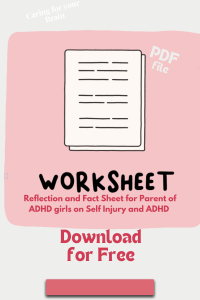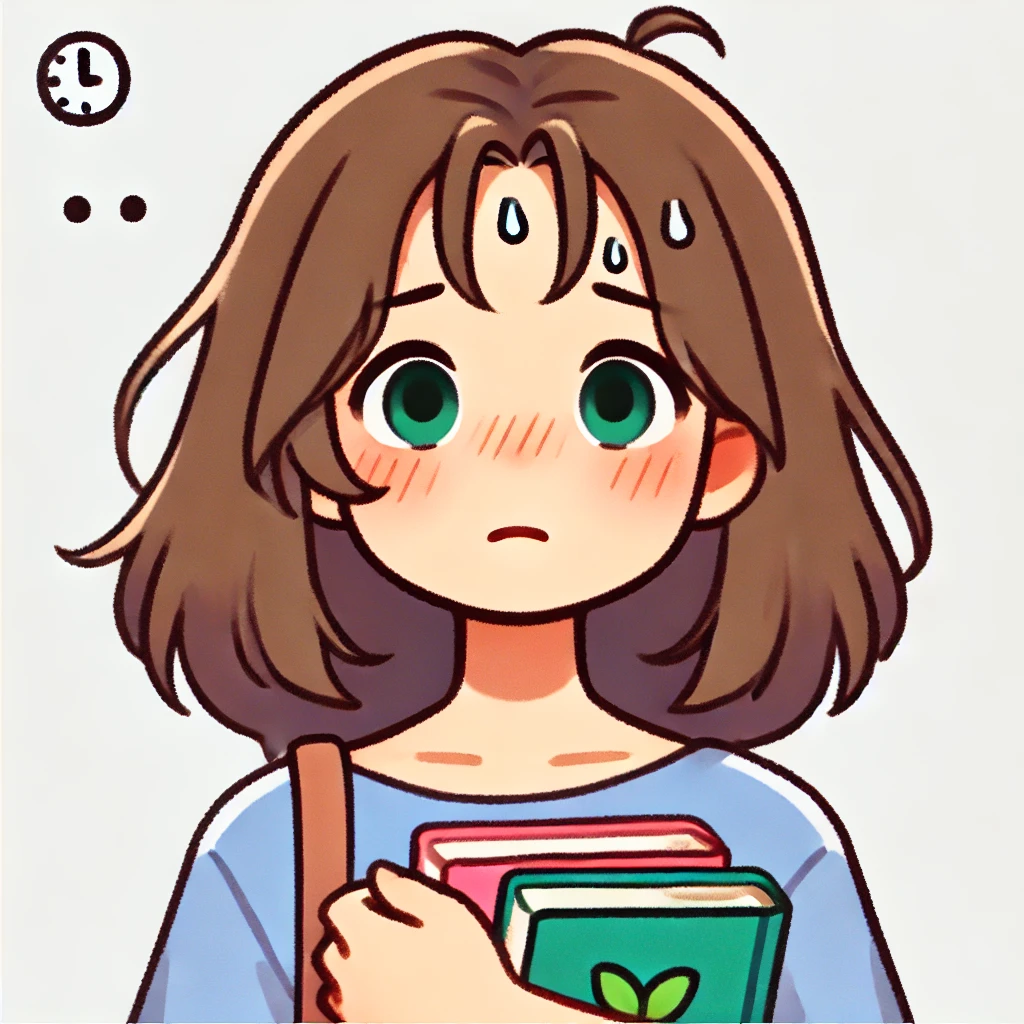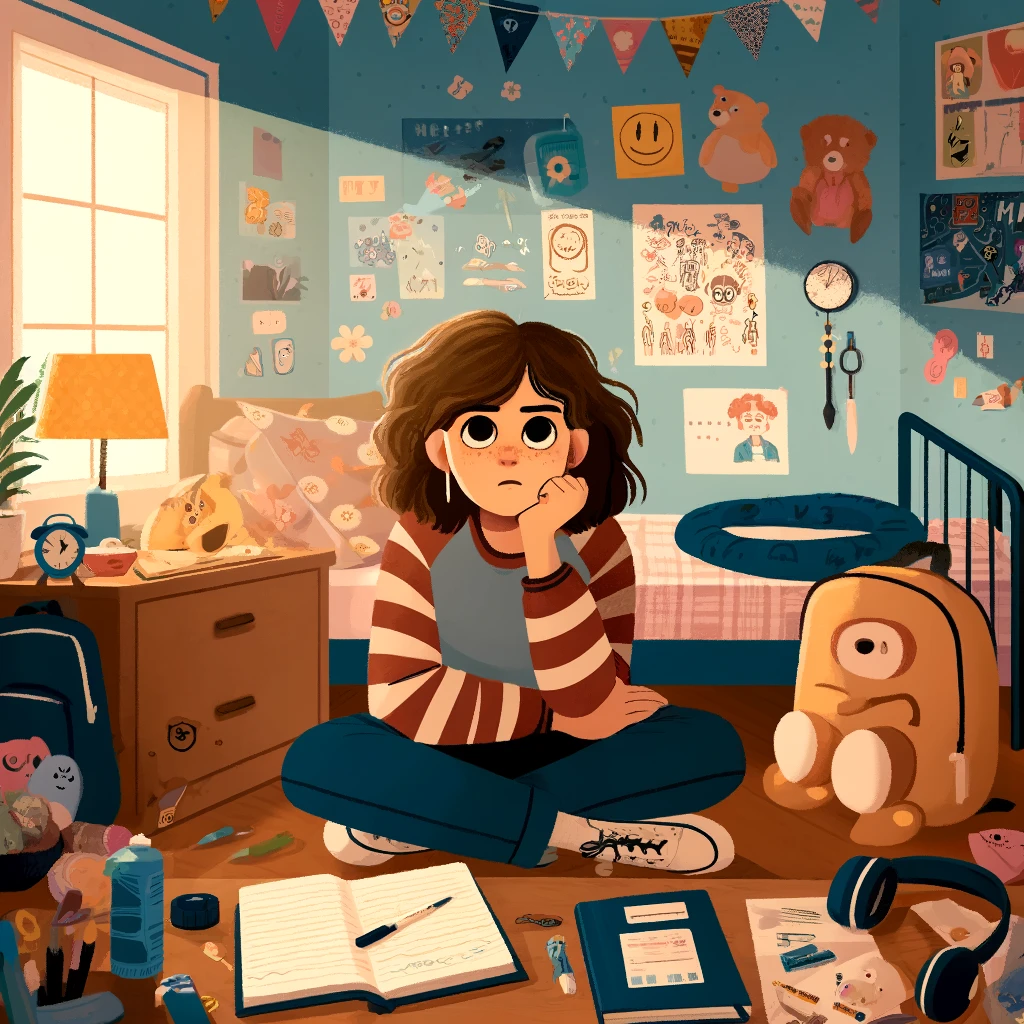
Talking to ADHD Girls About Self-Injury: A Guide for Parents

Help Talking to ADHD Girls about Self-Injury
Navigating conversations around self-injury with a teenage girl, especially an ADHD girl, can be challenging. Many young people use self-injury as a coping mechanism to manage intense emotions, and girls with ADHD are often at a higher risk due to emotional regulation challenges. Here’s a guide for parents on talking to ADHD girls about self-injury, understanding its roots, approaching the conversation, and supporting your child compassionately and effectively.

Download the Free Fact and worksheet for parents on self-injury printable
Why This Topic Matters
Talking to ADHD girls about self-injury is crucial because self-injury has become more common among teens, often as a response to overwhelming emotions, stress, or peer influences. For girls with ADHD, who may experience more intense emotions and struggle with self-regulation, self-injury can seem like a release. Understanding why self-injury happens and how to approach it can help you respond in a way that supports your child’s well-being and empowers her with healthier coping skills.
What You Need to Know About Self-Injury
Self-injury is often misunderstood. Here are a few things that are essential to know when talking to ADHD girls about self-injury:
- ✔️Self-injury isn’t typically a suicide attempt: For most teens, it’s a way to manage overwhelming emotions or to feel a sense of control. However with ADHD girls it may be more concerning if impulsivity is an issue.
- ✔️It can be a coping mechanism: Self-injury, such as cutting, can release endorphins, which create a temporary feeling of relief. However, this relief is short-lived and often followed by shame or guilt.
- ✔️ADHD and emotional dysregulation: Girls with ADHD often experience intense emotional swings, making them more vulnerable to coping mechanisms like self-injury.
Self-injury is sometimes a way for teens to cope with stressors such as breakups, school struggles, or family dynamics where emotions aren’t openly discussed. Like other behaviors, self-injury can be reinforced by the endorphin release, making it feel “helpful” in the moment.
What the Research Says
Research suggests that self-injury often begins as a response to emotional struggles, curiosity, peer influence, or major stressors. Teens with ADHD or other mental health concerns, such as anxiety or depression, may be more prone to self-injury as they seek ways to cope with heightened emotions.
How to Approach the Conversation
Talking to ADHD girls about self-injury can be intimidating, but an open, non-judgmental approach is key. Here’s how to get started:
- ✔️Choose the Right Moment: Make sure you’re both in a calm, private setting without distractions. Begin gently, expressing your concern without judgment.
- ✔️Be Compassionate and Curious: Let your child know you’re there to listen and understand rather than to punish. Asking open-ended questions like, “Can you tell me more about what you’re going through?” can help them open up.
- ✔️Acknowledge the Reasons Behind the Behavior: Self-injury can sometimes be an attempt to express or control emotions. Express empathy by saying things like, “It sounds like things have been really hard for you.”
- ✔️Avoid Shaming or Punishing: Reacting with punishment or anger may only increase your child’s distress and drive them to hide the behavior. Instead, acknowledge their pain and let them know you’re there to support them.
- ✔️Emphasize that Help is Available: Self-injury is often a sign that someone is struggling to manage their emotions. Let your child know it’s okay to ask for help, whether from you, a counselor, or a therapist.
Self-Injury and Self-Compassion: Teaching Healthier Coping Skills
When talking to ADHD girls about self-injury, it’s important to guide them toward self-compassion and emotional understanding. Therapy can provide ADHD girls with tools for recognizing and articulating their emotions, creating alternative ways to manage intense feelings. Self-injury can often be a result of not having alternative methods for handling intense feelings. To support them:
- ✔️Encourage Self-Compassion: Teach your child that all emotions are valid. Let them know they deserve understanding, not judgment, for what they’re feeling.
- ✔️Model Healthy Emotional Expression: Share your own experiences of managing emotions constructively and model positive coping skills, like deep breathing, journaling, or talking about feelings.
- ✔️Consider Professional Support: Therapy can be an excellent space for your child to explore and learn healthy coping mechanisms. Therapists can introduce methods such as mindfulness and emotional regulation techniques tailored to ADHD.
When to Seek Immediate Help
While talking to ADHD girls about self-injury, it’s important to know when to seek urgent support. Self-injury is generally not a suicide attempt, but certain behaviors may indicate a need for more intensive support:
- ✔️Deep cuts that require medical attention: Severe injuries can signal deeper emotional struggles.
- ✔️Suicidal thoughts or behaviors: If self-injury appears linked to suicidal intent, seek immediate professional help.
Takeaway: Talking to ADHD Girls About Self-Injury: An Opportunity for Growth
Although talking to ADHD girls about self-injury is difficult, it can open a path for growth in emotional awareness, self-acceptance, and healthy coping skills. Support your child by fostering open communication, seeking support when needed, and empowering her with tools for managing her emotions.
FAQ
- Self-injury can be a response to overwhelming emotions. Teens often encounter it through peer influence.
- Behavior should be addressed through open dialogue. Punishment or shaming can intensify distress and reinforce self-injury.
- Therapy can help teens develop alternative coping mechanisms, such as articulating emotions, problem-solving, and emotional expression skills.
Self-injury is rarely equated with suicidal intent but may require additional support if injuries are severe or if your teen has a history of suicide attempts. Supporting your ADHD daughter through this challenging time is an opportunity to help her build resilience and healthy coping skills for a lifetime.




